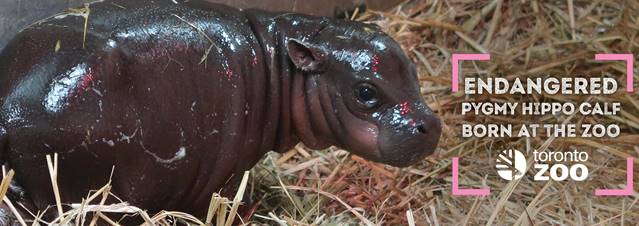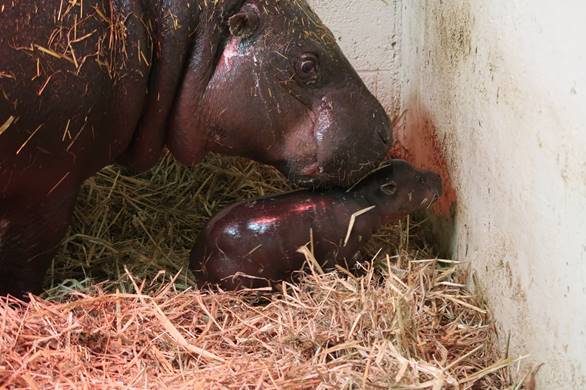
TORONTO ZOO WELCOMES BIRTH OF ENDANGERED PYGMY HIPPOPOTAMUS CALF

Mom, Kindia, with Endangered Pygmy Hippo Calf, Photo Credit: Toronto Zoo
FOR VIDEO OF THE ENDANGERED PYGMY HIPPO CALF WITH MOM:

TORONTO, ON, Tuesday, August 21, 2018: The Toronto Zoo would like to announce that Kindia, a 12- year-old female pygmy hippopotamus (Choeropsis liberiensis), gave birth to a female calf on Friday, August 10, 2018 at 10:52 pm.
This recent birth is very important for pygmy hippopotamus conservation as the species is currently listed as Endangered on the International Union for Conservation of Nature (IUCN) Red List of Threatened Species and there are only approximately 2,000 to 3,000 left in the wild in West Africa, with Liberia having the majority of the population. Small numbers are also found in the neighboring countries of Sierra Leone, Guinea and the Ivory Coast. Over the past 100 years, the pygmy hippo’s habitat has declined dramatically as a result of logging, farming and human settlement. As deforestation continues and their habitat becomes more fragmented, newly accessible populations are coming under increasing pressure from hunters.
A pygmy hippopotamus’ gestation period is about 180 - 210 days, after which a single calf is born. Subsequently, Kindia, was moved from public viewing into a maternity area within the Pygmy Hippo Habitat where video cameras were set in place for Wildlife Care to monitor her closely. While the calf appears healthy, and feeding well, the first thirty days will be critical for both mom and calf. Toronto Zoo Wildlife Care staff will continue to closely monitor Kindia and her calf in the maternity area, which is not visible to the public at this time. Kindia arrived to the Toronto Zoo from Parc Zoologique de La Fleche in Sarthe, France in June of 2016 as part of a global breeding program.
This is Kindia’s first surviving calf, and was sired by Harvey our 23-year-old male. This is the seventh birth of a pygmy hippopotamus in Toronto Zoo's history. The last surviving pygmy hippo to be born at the Toronto Zoo was a male named “Pogo” who was born September 2, 1999 to sire Psi and dam Cleopatra. Pogo left the Toronto Zoo in November 2003 and now resides in Tampa’s Lowry Park Zoo.
“Conservation efforts for endangered species has no boundaries and the more we work together internationally helps improve our chances of saving incredible animals like the pygmy hippo,” said Maria Franke, Curator of Mammals, Toronto Zoo. “Partnering with our colleagues by bringing Kindia over from France to mate with our male hippo has allowed us to strengthen the genetics of the global population.”
The Toronto Zoo is part of the Pygmy Hippopotamus Species Survival Plan (SSP), which aims to establish and maintain a healthy, genetically diverse population, and overall conservation efforts to save this incredible species. One of the Toronto Zoo's mandates is to educate visitors on current conservation issues and help preserve the incredible biodiversity on the planet. The Toronto Zoo is in a great position to bring forward the plight of the pygmy hippopotamus and supports hippopotamus conservation efforts in the wild through keeper awareness events and the Toronto Zoo Endangered Species Reserve Fund.
Please note, Kindia and her calf are not currently visible to the public.
Stay tuned for information on naming our new female pygmy hippopotamus calf!
For more information on the pygmy hippopotamus
- 30 -
Media Information:
Please note, media are not permitted in the maternity area of the Pygmy Hippo Habitat. Toronto Zoo's male pygmy hippo, Harvey, will be on exhibit for photo opportunities. Toronto Zoo staff will provide updates, photos and video as they become available.
Toronto Zoo Media Contacts:
Amanda Chambers, Public Relations and Events Associate
[email protected] or #416-392-5974
About The Toronto Zoo
The Toronto Zoo is Canada’s premier zoo and a national leader in saving wildlife to ensure the rich diversity of nature for future generations. More than a tourist attraction, the Toronto Zoo boasts a number of leading programs for helping wildlife and their natural habitats – from species reintroduction to reproductive research. A world-class educational centre for people of all ages, the Toronto Zoo is open every day except December 25 and attracts approximately 1.3 million visitors each year.
